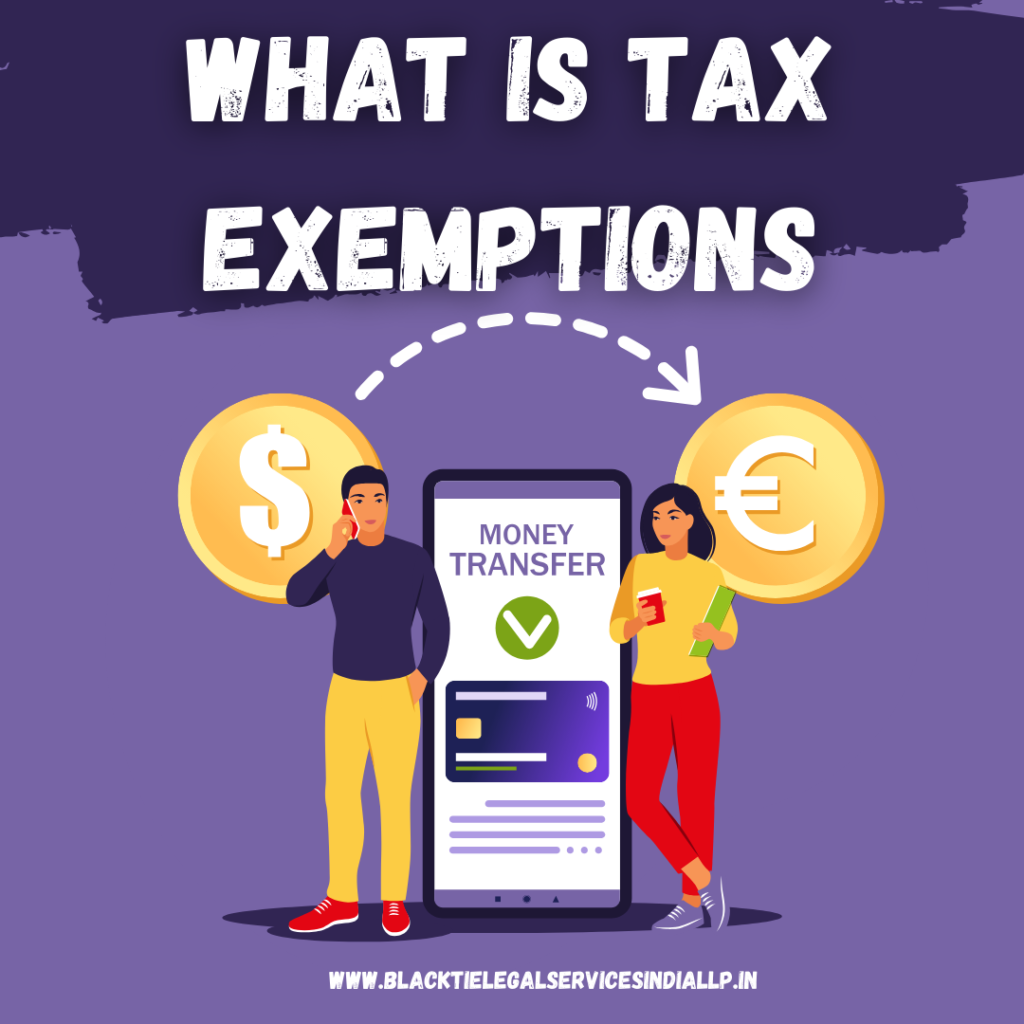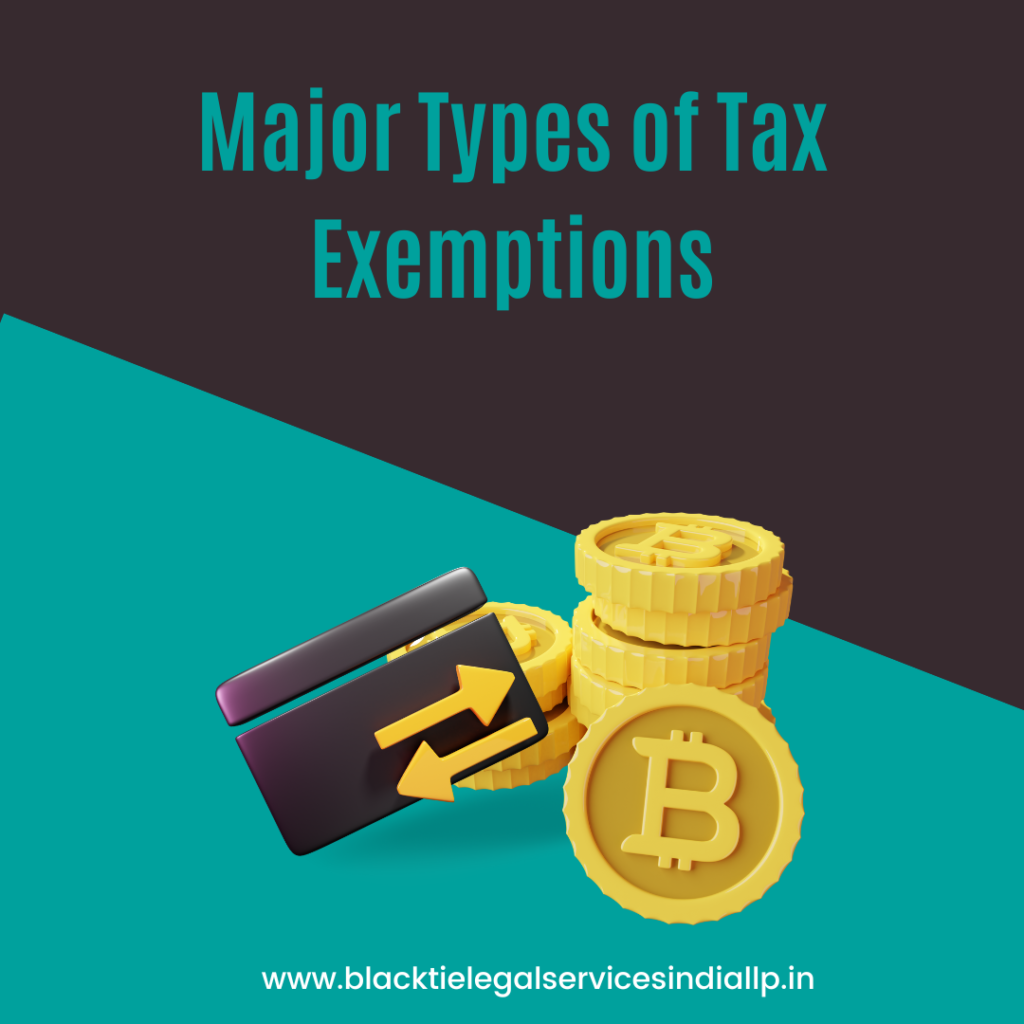All of you must know very well that tax exemption in India is considered a very important part of the Income Tax system of the whole country. It has been designed not only to provide relief to all the consumers but also to promote economic and social objectives, underscoring its significant impact.
With the help of such tax exemptions, the tax liability of any individual and company across the country is evened out, thereby providing a great incentive to save, invest or engage in specific activities that are beneficial to the economy.
We all expect tax exemption, but it’s crucial to have a good understanding of its various aspects. This knowledge empowers you to ask for tax exemption at the right place and for the right reason, making you a knowledgeable and empowered taxpayer.
Hence, we have comprehensively explained in detail the various tax exemptions available in India, their types, their impact and all aspects in this blog post.
What are Tax Exemptions?

Tax exemptions are a number of provisions included in the tax laws that allow all taxpayers residing in the country to reduce their taxable income, thereby reducing their overall tax liability significantly.
By reducing the taxable income, exemptions effectively reduce the overall tax burden significantly.
In our country, India, these exemptions are provided to all individuals under various sections of the Income Tax Act of 1961, and all these tax exemptions are applicable to different types of income and transactions. For example like, salary, investments and specific expenses.
Major Types of Tax Exemptions

There are so many valid types of tax exemptions, out of which we have mentioned some of the specific types below:
Tax Exemptions for Salaried Employees
| CATEGORY | EXEMPTION TYPE | DETAILS |
| Salaried Employees | House Rent Allowance (HRA) | In today’s current scenario in India, HRA is considered to be an essential component of the salary structure of a salaried person; hence, exemptions can be calculated on the basis of the minimum criteria. |
| “ | Leave Travel Allowance (LTA) | Every employee can easily claim LTA at least twice in a block of four years for travel within India. |
| “ | Transport Allowance | This allowance was given to the government employees of our country to meet their travel expenses. |
| “ | Medical Reimbursement | Earlier, all employees were allowed to claim exemption on medical expenses up to Rs 15,000 every year but now this too has been replaced by standard deduction. |
Tax Exemptions on Investments
| CATEGORY | EXEMPTION TYPE | DETAILS |
| Tax Exemptions on Investments | Public Provident Fund | Contribution to PPF is fully exempted under Section 80C, and the interest earned and maturity amount is also fully exempted under Section 10(11). |
| “ | Employee Provident Fund (EPF) | Similar to PPF, contributions to EPF are eligible for deduction under section 80C and interest and maturity amount are exempted subject to certain conditions. |
| “ | Equity-Linked Savings Scheme (ELSS) | ELSS is considered a type of mutual fund in India whose lock-in period is only 3 years. |
| “ | National Pension System (NPS) | Contribution to NPS is eligible for ₹50,000 under section 80CCD(1B) in addition to deduction under section 80C. |
| “ | Life Insurance Premiums | Premiums paid for life insurance policies are fully eligible for deduction under section 80C, and the maturity proceeds are exempted under section 10(10D). |
Tax Exemptions for Business and Self-Employed Individuals
| CATEGORY | EXEMPTION TYPE | DETAILS |
| Business/Self-Employed Individuals | Section 10AA | This section provides exemption only on profits earned from newly set up units in Special Economic Zones (SEZs). |
| “ | Section 80-IAC | It provides eligible startups a deduction of up to 100% of their profits for the first 3 years under their first 10 years. |
| “ | Agricultural Income | ELSS is considered a type of mutual fund in India whose lock-in period is only 3 years. |
Other Types of Tax Exemptions
| CATEGORY | EXEMPTION TYPE | DETAILS |
| Other Tax Exemptions | Charitable Organizations | Exemptions under Section 11, Section 12A, and Section 80G. |
| “ | Retirement Benefits | Exemptions on Gratuity, Commuted Pension, and Leave Encashment. |
| “ | Senior Citizens | Higher exemption limit, exemption on interest income, and no advance tax requirement. |
| “ | Non-Residents | Exemption on income from foreign sources, interest income, and double taxation relief. |
What are the Tax Exemptions Benefits?

Due to tax exemption, many types of benefits are seen in our country, India, which we have written below:
- Reduction in Tax Liability: Exemptions significantly reduce income, which helps result in potential tax savings.
- Lowers Tax Liability: With the help of tax exemptions, the total amount of tax payable can be reduced significantly.
- Optimistic Outlook: By reducing taxable income, tax exemptions can potentially increase the size of your tax refund, providing a reason to be optimistic about your financial situation.
- Financial Incentives for Charitable Giving: Tax exemptions provide a strong motivation for donating to qualified charities, allowing you to contribute to social causes while also benefiting from potential tax savings.
- Supports Education: it proves to be very helpful in reducing the cost of Education through deductions and credits.
- Promotes Home Ownership: The effective cost of home ownership can be reduced through deductions for both mortgage interest and property taxes.
- Improves Financial Planning: Reducing the tax burden allows for better budgeting and financial planning.
What is the Impact of Tax Exemptions?

Tax exemption has a significant impact on all the individuals and businesses of our country, which is very important to know about, so we have explained it in all its details below:
Financial Relief
Tax exemptions have a wide range of impacts, but the most crucial benefit is financial relief. Exemptions simply mean a reduction in total taxable income or the elimination of some taxes, and they can significantly reduce the taxes that some people or organizations have to pay.
Economic Incentives
Tax incentives are typically used to encourage behaviour in a particular way or to promote the development of certain sectors.
For example, exclusions on manufacturing equipment or renewable energy investments have a policy objective of promoting the related industries.
Support for Public Policy Goals
A large portion of tax exemptions can be seen as being in harmony with other public policy objectives, including encouraging charitable contributions, incentives for education, or assistance to vulnerable groups.
For example, deductions for contributions made to charitable organizations motivate people to make donations to fund the vital services provided by charitable organizations.
Equity Considerations
However, tax exemptions have their own benefits and, in the process, also raise issues of equity and fairness within the tax system.
Others believe that exemptions harm those who earn their revenue from specific sources due to the unfair distribution of tax rates.
Revenue Loss
The characteristic of tax exemptions is that they lead to loss of revenue which is one of the main risks for governments. Exemptions reduce the tax base, which hinders revenue collection and impacts the financing of public services.
Tips for Maximizing Your Tax Exemptions

You can significantly increase your tax exemptions options by keeping in mind a few points that we have mentioned below:
- Stay Informed: Stay informed on tax laws and any new changes which may impact your right for certain exemptions.
- Consult a Tax Professional: It is therefore to the advantage of an individual to consult a qualified tax advisor to determine and claim all possible exemptions.
- Plan Ahead: Some of these exemptions may have procedures that need to be initiated or capital to be spent on them, it is thus wise to plan for them.
- Review Regularly: Your circumstances unique to you change with time, and therefore, you need to review your exemptions as often as possible.
In Conclusion

Tax exemptions are a significant factor of the tax regime as they provide relief and incentives to persons, companies and entities.
Therefore, with knowledge in the different exemptions that are available, their advantages and the effects they cause, people will be able to make a proper decision when it comes to the issues of taxation.
However, there are certain problems associated with exemptions, some of which are fairness, loss of revenue, and bureaucratic issues.
It is therefore important to be aware of the changes and trends that occur with respect to tax exemptions, especially as tax policy evolves over time.
So, in this blog post, we have covered all the aspects of tax exemptions for everyone with a good an accurate analysis, which will definitely be helpful for you some time or another.
Lastly, we hope that you did not face any kind of complexity while reading and understanding tax exemptions blog posts.
FAQs
Q1. Can NRIs claim tax exemptions in India?
A1. NRIs can claim tax exemptions in India on specific income types and investments, similar to residents, but with certain limitations.
Q2. What exemptions are available for charitable organizations?
A2. Charitable organizations can enjoy exemptions from income tax, customs duty, and excise duty, subject to specific criteria and conditions.
Q3. How to avoid tax on salary?
A3. Legally reduce taxable salary income by maximizing deductions like HRA, LTA, and investments in PPF, ELSS, and NPS.
Q4. How much HRA can be claimed?
A4. HRA exemption is the lowest of actual HRA received, 50%/40% of basic salary (metro/non-metro), or actual rent minus 10% of basic salary.
Q5. How is CTC calculated?
A5. CTC (Cost To Company) is calculated by summing all the monetary benefits an employer provides to an employee throughout the year. Here’s the formula:
CTC = Gross Salary + Benefits


Add a Comment